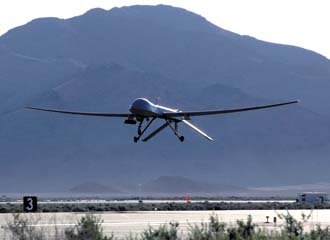NATO Agency Infuses Opportunities Into Dutch Economy
 |
Nine NATO nations recently have agreed to share data from costly intelligence, surveillance and reconnaissance assets, such as unmanned aerial vehicles. The cooperative effort is expected to enable better sharing for missions outside of Afghanistan, including anti-piracy efforts, and to offer business opportunities for industry. |
The story of the technology marketplace in the Netherlands is much like that of other countries in Europe and around the world. The economic downturn has led to slashed government budgets, greater outsourcing and a need for companies to expand internationally. One thing that sets the Netherlands apart, though, is the NATO Consultation, Command and Control Agency, which has an office in The Hague, as well as in Brussels, Belgium, and offers opportunities not found elsewhere.
One of the primary missions of the NATO Consultation, Command and Control Agency (NC3A), which was established in 1996, is the acquisition of state-of-the art command, control, communications, computers, intelligence, surveillance and reconnaissance capabilities for the NATO alliance. The responsibilities under this mission range from the procurement of commercially available communication and information technology products and services on an urgent, expedited basis to the procurement of complex major systems through an international competitive bidding process. The organization invests more than €350 million ($500 million) annually on NATO’s behalf into the technologies that “are the glue that holds NATO together,” according to Kevin Scheid, deputy general manager of the NC3A.
With economies still struggling worldwide, doing business with the NC3A has become a core part of the business strategy for companies in the Netherlands and elsewhere. “NATO is one of our spearheads in developing our business,” says Louis Frank, public sector operations director for Logica.
The NC3A offers a variety of opportunities. Logica, for example, holds an exclusive framework agreement with the agency to provide a variety of services, some classified. In March, the agency announced an agreement among NATO nations to pool resources for purchasing capabilities to counter improvised explosive devices (C-IEDs). With IEDs proving to be the most lethal threat to military forces in Iraq and Afghanistan, countering those devices is one of NATO’s most critical missions. The NATO nations identified 47 specific areas where a multinational approach will bring lower costs, greater efficiency and effectiveness. Areas include joint acquisition of material such as jammers against remotely controlled IEDs, entry control point sensors, joint development and testing of new technologies, common standards and cooperation on training. The technologies packages are scalable and flexible, allowing nations to focus on specific areas of interest and avoiding a one-size-fits-all solution.
The agency also announced in March that nine nations have launched an effort to improve the sharing of intelligence, surveillance and reconnaissance data. Under the agreement, technology that currently is being used successfully in Afghanistan will be developed further and applied in a wider context, including combating piracy. The effort is expected to make it easier and faster for nations to share imagery from high-priced assets such as unmanned aerial vehicles. The project was launched in Rome in February. The agreement will amount to more than €100 million ($145 million) and involve companies from the participating nations: Canada, France, Germany, Italy, the Netherlands, Norway, Spain, the United Kingdom and the United States.
NATO also is working to provide greater interoperability among cooperating nations. One major project, for example, includes an effort to improve interoperability among the various systems for tracking friendly and enemy forces. The NATO common operational picture is expected to be valued at about €30 million ($45 million). “A lot of NATO countries have developed battlefield information systems that tell you, for instance, where your own troops are and where you know or expect the enemy to be,” Frank explains. “Those systems are working pretty well, but they aren’t connected, so NATO is developing a generic interface between those battlefield systems so that commanders can see into each other’s systems and know where all their forces are.”
Domestically, Dutch companies also are searching for government outsourcing opportunities to help weather the economic storm. The government is outsourcing much of its information and communications technology (ICT) work as part of its effort to slash budgets. “Government [functions] in Europe are very hard because of the financial crisis, and there are huge savings operations. Government is under a lot of pressure,” Frank explains. “Based on financial problems, the Dutch government is forced to look into larger outsourcing deals. They’ve been reluctant to get into that type of business, but in the last few years we’ve seen a gradual shift.”
ICT outsourcing opportunities include human resources, financial services and logistics. The Dutch military services, for example, are consolidating their ICT infrastructure into an approach based on single Systems, Applications and Products in Data Processing, or SAP. In addition, 10 of the 13 Dutch ministries have banded together to outsource their human resources systems, and the country’s social security agency, which provides benefits to the unemployed, is working with Logica to build an Internet portal to automate some processes. The Internet portal is expected to be up and running this year. “Up to now, it was all manual labor, meaning you had to call someone or visit an office. We’re now trying to develop an Internet portal so that you can do that kind of work more intelligently and for yourself from your own home,” Frank says.
Additionally, the Dutch police forces are consolidating from about two dozen mostly self-sufficient regional police units down to just 10 and will be outsourcing much of their application management for ICT systems. That contract is expected to be one of the larger opportunities to be available in the Netherlands, according to Frank. The agriculture ministry also is outsourcing much of its ICT housing and hosting, as well as application management under an effort valued at about €100 million ($145 million).
 |
A U.S. Army soldier prepares the Blue Force Tracker for his high mobility multipurpose wheeled vehicle, or HUMVEE, before departing Camp Victory in Iraq. Several NATO countries have developed force tracking software, and NATO’s Consultation, Command and Control Agency intends to develop a common interface allowing for greater interoperability between the systems. |
Frank reports that the country is seeing signs of a turnaround. “In the financial sector, there’s growth again in larger industrial areas. For mid-sized companies in the Netherlands, it’s still very hard, and government spending is under heavy pressure. That’s the general tendency, not just in the Netherlands, but in all of Europe,” he says.
The Netherlands Foreign Investment Agency (NFIA) boasts that the country has one of the most advanced ICT infrastructures in the world. The size of the ICT market in the Netherlands was nearly €31 billion ($45 billion) in 2008 and now is growing at a healthy rate of 4.5 percent, according to NFIA statistics. About 26,000 companies are involved with various ICT-related activities. They generate €29 billion ($42 billion), or 5.5 percent, of the country’s gross domestic product and create employment for 250,000 people, or 3.5 percent, of the total work force. The Netherlands is one of the world’s top five exporters of ICT services. Besides services and software solutions, the Netherlands is strong in broadband connectivity, networking, security, storage and gaming.
The Dutch embassy reported in February that investment from and trade with the Netherlands supports more than 700,000 U.S. jobs. The Dutch are the third largest investors—nearly $238 billion—in the United States. Likewise, the United States, at about $471 billion, is the largest foreign investor in the Netherlands. The Netherlands is the number one destination for U.S. investments, according to the embassy.
The NFIA reports that the Netherlands ICT industry offers wide access to high-speed Internet broadband with 80 percent of broadband lines offering download speeds of two megabits per second or greater, allowing the use of Web 2.0 and video streaming. About 40 percent of the Dutch population has broadband access. The country also has an extensive glass fiber telecommunications infrastructure and is highly ranked in network readiness.
Known as an innovation incubator, the Netherlands is the birthplace of the compact disc, wireless Internet and Bluetooth. It is home to well-known companies such as Centric, Altran and KPN Telecomm. A host of international companies, including Siemens, Cisco, Dell Computer and Abaco International, also have found a home in the Netherlands.
WEB RESOURCES
NATO Consultation, Command and Control Agency: www.nc3a.nato.int/Pages/default.aspx
International Security Assistance Force: www.isaf.nato.int/
Netherlands Foreign Investment Agency: www.nfia.com/
NATO Consultation, Command and Control Agency (NC3A) Responsibilities - Central planning, systems integration, design, systems engineering, technical support and configuration control for NATO command, control and communications (C3) systems and installations. - Scientific and technical support to the strategic commands. n Technical support and advice in the areas of operations research, surveillance, electronic warfare, airborne early warning and control, communications and information systems, and air command and control, including theater missile defense. - Immediate support to NATO military authorities during military operations. - Technical policy and standardization work for the NATO C3 board and its substructure. |



Comments